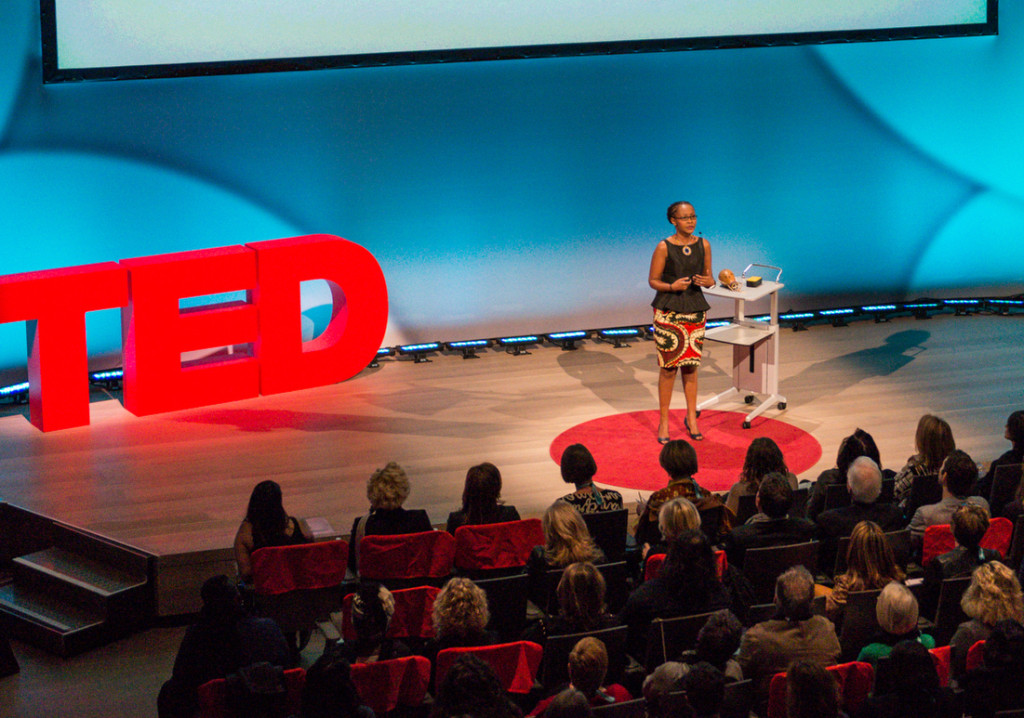Juliana Rotich is helping to nurture the next great iteration of technology innovation — and innovators. The non-profit tech organization that she co-founded, Ushahidi, builds tools to democratize information and increase transparency online through apps, open-source software, and physical products. Roitch is also a founder of iHub, a tech space in Nairobi, Kenya, that’s both a co-working space and an incubator, where ideas for advancements can come to life in Africa. (Apparently, she also finds time to sleep, but we’re skeptical.)
At TEDWomen in San Francisco, she spoke about Ushahidi’s latest product: BRCK, a small, rugged box that’s something like a backup generator for Internet access, designed specifically for the roughest conditions. After her TED talk, I spoke to Rotich in a small room away from the buzzing main floor of the SFJazz Center to talk a little about innovation in developing environments. Rotich’s experience is evident — but most importantly, her spirit is energizing.
TBQ: How do you go about identifying projects that are most important in an environment that has so many needs?
JULIANA ROTICH: I think it comes back down to what is the problem that is being tackled by the solution. That’ll be a first point, and then also the appropriateness of the solution to the situation is a factor. That’s number one. I think the sensibility that we have as a team is one that looks at the functionality. Some people use design to drive function, but on our side we look at function to drive the design. Like with the BRCK, the function drove what we made. If you look at the BRCK, it’s quite rugged, because the environment that it’s set to be in is a very tough environment. You’ve got to be able to drop it or, it’s dust-proof… Sometimes you have to look at the environment in which a product is going to be used that is it meeting the needs of that particular context.
TBQ: How does the definition of innovation change in a country that doesn’t have the same type of advancement that a place like the U.S. does? What does the definition of “innovation” look like to you?
JR: I’m finding that I’m constantly surprised by the inventiveness of people in the developing world. There isn’t much, so they use whatever is available to make. You’ll find someone who’s a hobbyist with robotics that makes things with scrap parts, transistors from an old radio and capacitors from a piece of electronics that was disassembled. When I look at it that way, I’m constantly surprised… In the developed world, it could be thinner film solar cells, or a better battery, things like that, an incremental step that’s taking something to the next level. In the developing world, you’re seeing things being put together in such a different and interesting way that I actually think it’s quite surprising for me. What kind of lens do you want to look at this with? Do you want to do a comparison? Or do you want to look—
TBQ: —at the unique challenges for the environment.
JR: Exactly. The uniqueness of the solution.
TBQ: And then it becomes a question of really nurturing the talent for that specific environment.
JR: Exactly.
TBQ: What’s been your greatest challenge for nurturing new talent?
JR: Lack of equipment. We don’t have new fabrication facilities. We just had a hacker camp. Half of the motors failed, but we still made stuff. I think that’s probably the biggest challenge. There also isn’t much of an ecosystem at this point. With the software industry we’ve put a lot of time into working with government and different stakeholders to bolster the ecosystem when it comes to mobile apps, but for making physical objects, we really don’t have that. So the first challenge isn’t only the physical equipment, but also the regulatory environment. To import circuit boards, we’re paying upwards of 200 percent duty.
TBQ: Has the government been supportive when you come to them with initiatives?
JR: Ha… It’s not on their radar. They’re not looking there yet. Sometimes things get to their ear from international media from things like this, like TED, and they go, Oh, okay…, and maybe they’ll give us time to chat. I think there’s still so much to do to create an enabling environment, but that is not stopping us. We’re getting started and hopefully we can get some supporters who can help us get to the next level.

